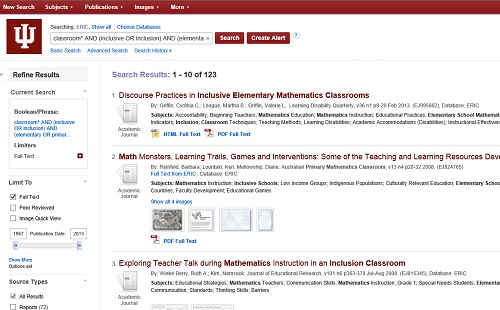These last few weeks, we’ve been exploring where and how to do deep, scholarly research in the various disciplines, and this week we will look at education. Building off the general techniques we explored earlier, there are a lot of great sources for education research, and tools that meet the unique needs of teachers-to-be.
For research articles, powerful tools like ERIC and ProQuest Education are the best sources to start with. If you’re interested in teaching theory, Professional Development Collection is an excellent choice. And depending on the grade level you’re interested in, there are even more databases designed for you – Primary Search for elementary grades, Middle Search for middle school grades, and MAS Ultra School Edition for high school. And ProQuest Dissertations, while not solely dedicated to education topics, has a remarkable depth. All of our education oriented databases are listed together here.
So, for example, we might have a question like “At the grade school level, what is the best way to promote an inclusive classroom when teaching mathematics?” Using the basic techniques we’ve studied in education databases, we might use a search like this:
You can see that we’re looking for four concepts with this search (the words marked with asterisks or grouped in parentheses) and excluding a fifth concept (a grade level we’re not interested in). A search like this will give us what we need quickly. If we’d just typed ‘inclusive classroom’, we would have had to browse through many more articles that were not relevant to us.
But education has a number of special topics and needs that aren’t similar to what you would look for in any other discipline. Fortunately, there are plenty of sources for those needs, too.
STANDARDIZED TESTING
Standardized tests are a fact of life in any level of education, and you may need to teach students how to prepare for one (or even to prepare for a graduate level test like the GRE, GMAT, or LSAT yourself). The Testing & Education Reference Center has information, study materials, and practice tests for all levels of education from high school through doctoral study – including some major international tests. And eBrary, while dedicated to more types of books than ones about testing, has a number of excellent study guides for the major standardized exams, as well as academic books critiquing them.
CURRICULUM STANDARDS
What does your course need to include? A major part of a new teacher’s work is creating content for their courses that meets very specific learning objectives. Some of these are dictated by the school, but others are decided by the state. What standards your curriculum needs to adhere to will depend on where you teach, but in Indiana, the Department of Education has laid these out in significant detail, from Kindergarten through High School. These include core and discipline-specific standards for every type of course you might teach. Because these standards can change from year to year, keeping up with the curriculum standards for your courses can be a major part of a teacher’s personal continuing education.
LESSON PLANS AND WORKSHEETS
Curriculum standards are important general guidelines, but the actual practice of teaching includes far more. What will you say in class? What questions will you put on your tests and quizzes? What sorts of handouts and activities will you have your students do? Obviously, you have a lot of freedom to make this part of the job your own. You can make up your own lesson plans, and don’t need to blindly follow what someone else has done. But it can be very helpful to see samples, or modify something to fit your needs.
Databases like Teaching Books are excellent for this. It includes book guides and lesson plans for over 15,000 books, for readers from kindergarten to 12th grade. Suggestions are given for how to prepare and evaluate, as well as handouts and activities. And the Indiana Department of Education can again be a great resource, particularly as their lesson plans and handouts will already conform to Indiana curriculum standards. InDoD’s internal search engine isn’t the best, but you can search their webpage easily using the ‘site’ command in Google. Try a search like this:
To get back hundreds of results that have been vetted by InDoD. While doing academic research on the free internet is always risky, using the ‘site’ command like this can effectively eliminate spurious commercial results.
With these tools, looking for research on education can be easy. But if you have any questions, please contact us at iueref@iue.edu!



